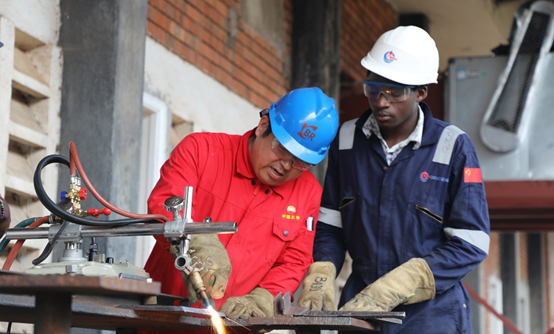

“Plenty of facts like these are proof that the Belt and Road Initiative (BRI) is not a “debt trap” that some countries may fall into, but an “economic pie” that benefits the local population; it is no “geopolitical tool”, but a great opportunity for shared development.” Chinese State Councilor and Foreign Minister Wang Yi said at a press conference on the sidelines of the national legislature annual session on March 8.

Chinese built Ethiopia-Djibouti railway is the first trans-boundary and longest electrified railway on the African continent. The photo shows that a little girl is showing her ticket. (Photo by Lv Qiang from People’s Daily)
Six years since it was proposed, the BRI has become the largest platform for international cooperation and the most welcomed global public good.
“To date, 123 countries and 29 international organizations have signed BRI agreements with China. They have cast a vote of support and confidence in the BRI.” Wang Yi said.
Wang Yi introduced that thanks to the BRI, East Africa now has its first motorway, the Maldives has built its first inter-island bridge, Belarus is able to produce passenger vehicles, Kazakhstan is connected to the sea, Southeast Asia is constructing a high-speed railway, and the Eurasian continent is benefiting from the longest-distance freight train service.
“Signing up for the BRI has enabled countries to grow at a faster pace, improve their people’s lives and reap win-win outcomes.” Wang Yi said, adding that all new initiatives need time to mature, and China welcome constructive suggestions from our BRI partners to fully reflect the principle of consultation and cooperation for shared benefits.

A Chinese instructor is training a local student in a vocational institute in Uganda. (Photo by Lv Qiang from People’s Daily)
As one of the most important diplomatic events at home, the second Belt and Road Forum for International Cooperation (BRF) will be held in Beijing in late April. The theme of BRF this year is “Belt and Road Cooperation: Shaping a Brighter Shared Future”.
Wang Yi introduced that the second BRF aims to bring about high-quality cooperation under the BRI. Chinese President Xi Jinping will give a keynote address at the opening ceremony and chair a leaders’ roundtable. There will also be a high-level meeting, thematic forums and a CEO conference.
“The number of foreign heads of state and government expected to attend will be much larger than that of the first BRF.” Wang Yi said, adding that there will be thousands of delegates from over 100 countries who attend the second BRF.
 Fire brigade in Shanghai holds group wedding
Fire brigade in Shanghai holds group wedding Tourists enjoy ice sculptures in Datan Town, north China
Tourists enjoy ice sculptures in Datan Town, north China Sunset scenery of Dayan Pagoda in Xi'an
Sunset scenery of Dayan Pagoda in Xi'an Tourists have fun at scenic spot in Nanlong Town, NW China
Tourists have fun at scenic spot in Nanlong Town, NW China Harbin attracts tourists by making best use of ice in winter
Harbin attracts tourists by making best use of ice in winter In pics: FIS Alpine Ski Women's World Cup Slalom
In pics: FIS Alpine Ski Women's World Cup Slalom Black-necked cranes rest at reservoir in Lhunzhub County, Lhasa
Black-necked cranes rest at reservoir in Lhunzhub County, Lhasa China's FAST telescope will be available to foreign scientists in April
China's FAST telescope will be available to foreign scientists in April "She power" plays indispensable role in poverty alleviation
"She power" plays indispensable role in poverty alleviation Top 10 world news events of People's Daily in 2020
Top 10 world news events of People's Daily in 2020 Top 10 China news events of People's Daily in 2020
Top 10 China news events of People's Daily in 2020 Top 10 media buzzwords of 2020
Top 10 media buzzwords of 2020 Year-ender:10 major tourism stories of 2020
Year-ender:10 major tourism stories of 2020 No interference in Venezuelan issues
No interference in Venezuelan issues
 Biz prepares for trade spat
Biz prepares for trade spat
 Broadcasting Continent
Broadcasting Continent Australia wins Chinese CEOs as US loses
Australia wins Chinese CEOs as US loses